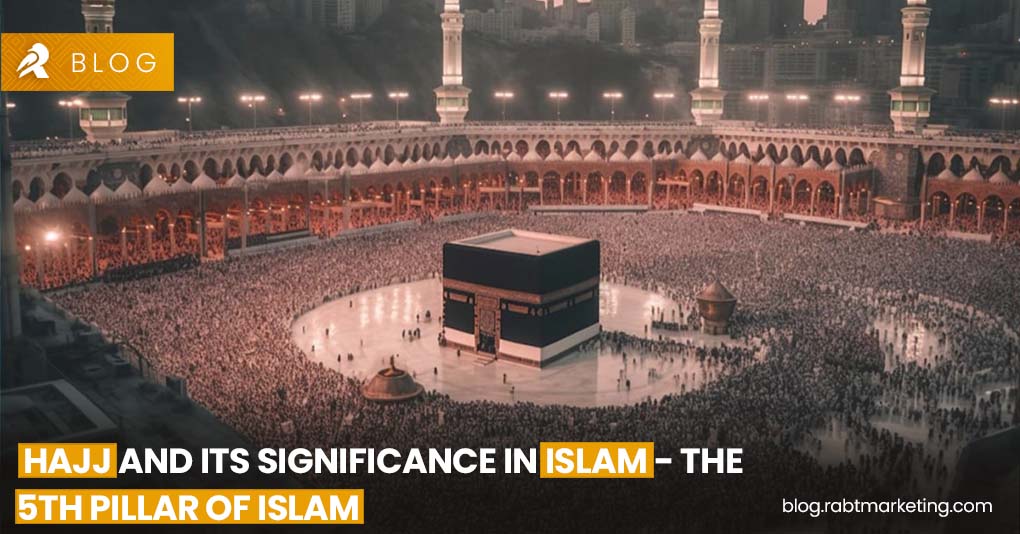What is Hajj?
Hajj is considered the 5th pillar of Islam. Hajj is an annual Islamic pilgrimage to Mecca, a journey towards Holy Kabbah located in Makkah, the holiest city for Muslims. It is a mandatory religious duty for Muslims that must be carried out at least once in their lifetime by all who are physically and financially capable of undertaking the journey. All Muslims financially able to perform Hajj, should perform this “Farz” once in their life. Hajj represents a fundamental aspect of the Muslim faith and practice. Hajj is a time of Reflection, Renewal, and Repentance.
Significance of Hajj in Islam
Hajj, the 5th pillar of Islam, is a significant act of worship and pilgrimage. Every year, a considerable number of Muslims wear ihram (unique dress for Haji’s), setting aside differences in color and race to gather in the holy area of Haram. This remarkable display of unity by Muslims amazes the world and terrifies the non-muslim world.
During Hajj, pilgrims receive boundless blessings and Allah’s special favor.
The pilgrimage to Mecca brings many benefits beyond the physical journey. It offers a unique chance for Muslims to cleanse their souls and seek forgiveness. Performing Hajj shows devotion and submission to Allah, highlighting humility and unity among believers.
The Quran and Hadith emphasize the significance of Hajj in spiritual growth and development. They highlight its power to purify the heart and renew faith. The rituals of Hajj symbolize the challenges faced by the Prophet Ibrahim (علیہ السلام) and his family, showing their deep trust in Allah.
Thus, Hajj is deeply significant in Islam. It brings Muslims closer to Allah, helps them seek forgiveness, and fosters unity among diverse communities.
Rituals of Hajj
The rituals of Hajj are deeply symbolic and take place over six days in the Islamic month of Dhul-Hijjah:
- Ihram: Ihram is a state of spiritual purity and equality, signified by wearing simple white garments.
- Tawaf: Circling the Kaaba seven times in a counter-clockwise direction.
- Sa’i: Walking seven times between the hills of Safa and Marwah.
- Standing at Arafat: Spending the afternoon near Mount Arafat in prayer and reflection.
- Muzdalifah: Collecting pebbles for the ritual of stoning the devil.
- Ramy al-Jamarat: Throwing stones at three pillars, symbolizing the rejection of evil.
- Sacrifice (Qurbani): Sacrificing an animal to commemorate Prophet Ibrahim’s willingness to sacrifice his son.
- Tawaf al-Ifadah: Another circumambulation of the Kaaba.
- Tawaf al-Wada: The farewell circumambulation performed before leaving Mecca.
Types of Hajj in Islam
There are three types of Hajj:
- Hajj al-Ifrad: Performing Hajj alone without combining it with Umrah.
- Hajj al-Tamattu: Performing Umrah during the Hajj months, exiting Ihram, and then re-entering Ihram for Hajj.
- Hajj al-Qiran: Combining Hajj and Umrah without exiting Ihram in between the two rituals.
Difference Between Hajj and Umrah
| Aspect | Hajj | Umrah |
| Timing | Performed annually during the Islamic month of Dhul-Hijjah | Can be performed at any time of the year |
| Obligation | Mandatory for all Muslims who are physically and financially able, once in a lifetime | Not Obligatory, but Recommended |
| Duration and Rituals | More extensive rituals, including standing at Arafat, Muzdalifah, and Mina | Shorter and Fewer Rituals, primarily Tawaf and Sa’i |
| Spiritual
Significance |
One of the 5 pillars of Islam,with exceptional significance as “Farz” | A voluntary act of worship with spiritual benefits, but not as significant as Hajj |
Importance of Hajj in Light of the Holy Quran
Hajj holds great importance in Islam, as emphasized in the Holy Quran:
- Surah Al-Baqarah (2:196) states, “And complete the Hajj and ‘Umrah for Allah.”
- Surah Al-Imran (3:97) mentions, “And [due] to Allah from the people is a pilgrimage to the House – for whoever is able to find a way.”
These verses highlight that Hajj is a duty owed to Allah by every Muslim who meets the requirements.
Importance of Hajj in Light of “Ahadees”
The sayings of the Prophet Muhammad (PBUH) further emphasize the importance of Hajj:
- Sahih Bukhari (Hadith 1521) reports that the Prophet said, “Whoever performs Hajj for Allah’s pleasure and does not have sexual relations with his wife and does not do evil or sins then he will return (after Hajj free from all sins) as if he were born anew.”
- Sahih Muslim (Hadith 1350) records the Prophet saying, “Hajj wipes out whatever (sins) came before it.”
These Ahadees illustrate that Hajj purifies a believer’s soul , cleans his heart and revives his soul.
Read more interesting blogspots on Rabt Blogs
The Final Words
Hajj is not just a physical journey but a profound spiritual experience that symbolizes unity, humility, and devotion. It’s an act of worship that transforms the believer, reinforcing their faith and commitment to Allah. By understanding the essence and rituals of Hajj, Muslims can better appreciate this significant pillar of Islam.
Remember, Hajj is a blessed opportunity of Allah Almighty. It is an act of pleasing Allah and his beloved prophet Hazrat Muhammad (S.A.W). If you are physically and financially able, make the intention to fulfill this obligation and experience the ultimate act of worship.
Hajj Mubarak to all Muslims from team of Rabt Marketing.

